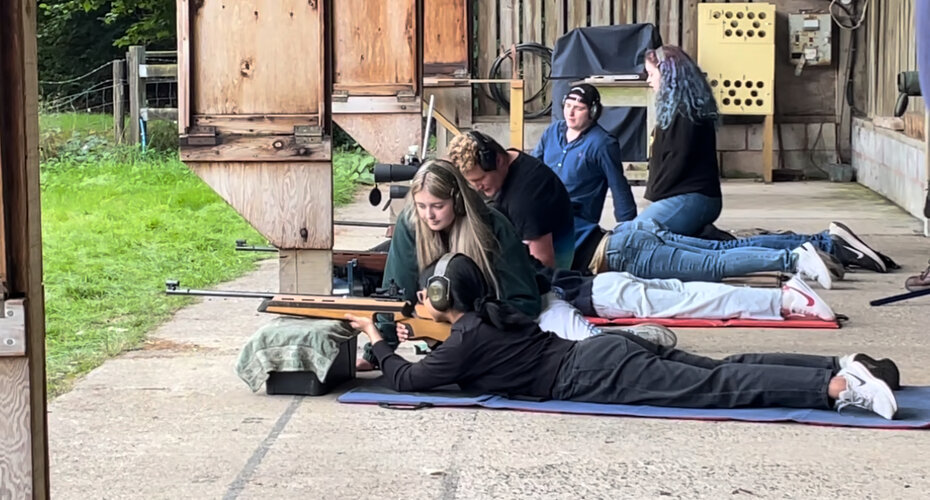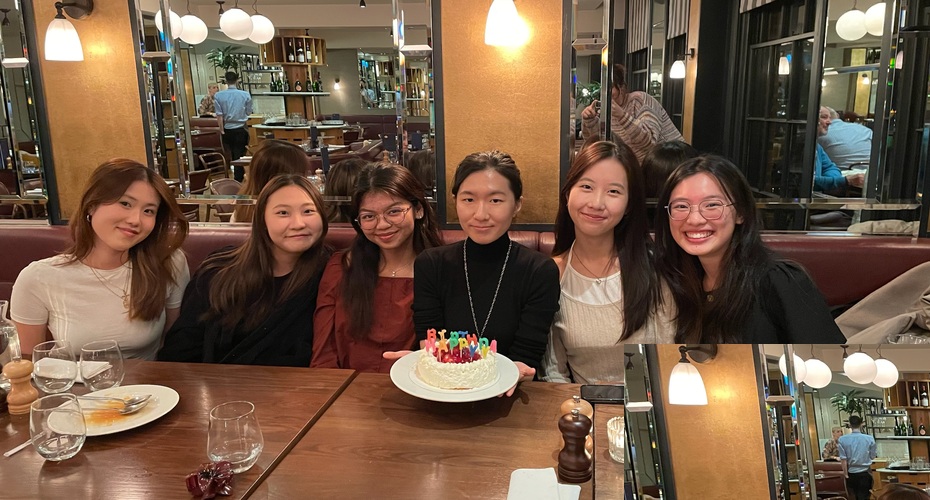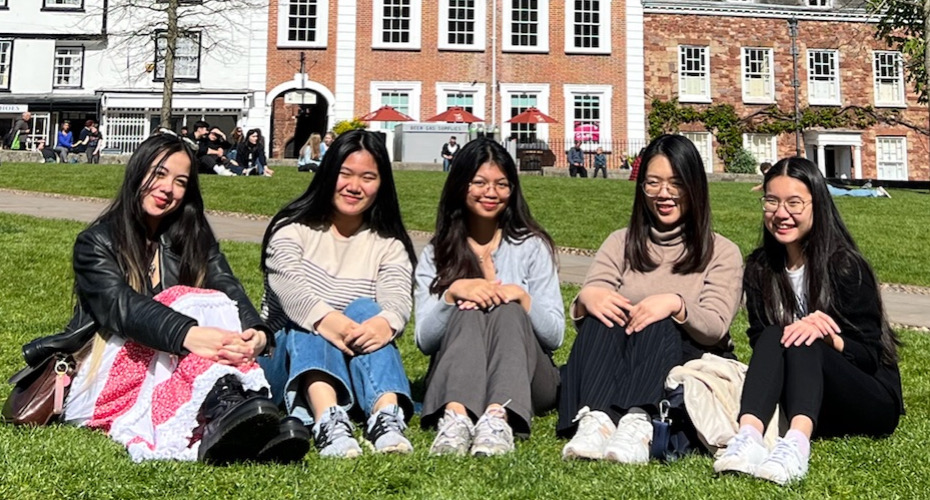Hi everyone! My name is Naura, I am from Indonesia, and currently in my third year studying Psychology at the University of Exeter. As an international student, moving to a new country and experiencing the world for the first time was a huge step. Questions like “Will I fit in?” and “Will I miss home?” constantly ran through my mind, and honestly, they all came down to one thing: Would I make friends? I definitely had my fair share of homesickness and struggled to find my people, especially during my first year. Now, in my final year, I am lucky enough to have built groups of friends that make my university experience so much more enjoyable. It wasn’t always easy, but I want to share how I got here, and hopefully it will help you too.
Making the most of Welcome Week
Before lectures and assignments kick in, the University holds Welcome Week (also known as Freshers’ Week), during which student societies set up booths across the Forum on Streatham Campus as well as at the St Luke’s and Penryn campuses. With around 450 societies in total, ranging across sports, arts, culture, religion, and fan clubs, there is something for everyone. Honestly, this is probably the busiest the University feels all year! It is a great time to meet new people, explore different interests, and sign up for societies you might enjoy. And if you are unsure about committing straight away, don’t worry, many societies offer free taster sessions where you can try out different activities with no pressure to join.
During my first year, I decided to step out of my comfort zone by trying out taster sessions offered by different societies. One of the most memorable was joining a free session with the Rifle Club, something I never imagined I would do! Later during the term, I also tried badminton, tennis, volleyball, and squash through Pitch Up and Play events, a casual, drop-in initiative especially popular around spring. The Students’ Guild also runs events every week, e.g. meeting therapy dogs, craft workshops, movie nights, Wellbeing Café, etc. To keep up with everything happening, make sure to follow @exeterguild on Instagram! Trying these activities was such a fun way to stay active, bond with others, and meet new friends in a relaxed setting.

When the excitement wears off
After a few weeks, once the buzz of Welcome Week fades, things can start to feel… a bit lonelier. If you are an international student from a particularly sociable culture, the UK’s independent culture might take some adjusting to, and as term goes on you might notice people getting busier with their own schedules. Although by this point you may know a few faces, real friendships take time to grow, and that is when homesickness can really start to kick in.
When I realised I was struggling, I reached out to my personal tutor. She encouraged me to find spaces that felt more familiar and comfortable, places that aligned with my culture and religion, which are both huge parts of my identity. Following her advice, I joined the Indonesian Society and later became part of the committee. Getting involved meant attending regular meetings, helping organise events, and gently pushing myself to socialise more often. Through the Indonesian Society, I had the chance to participate in cultural events like the South East Asia Gala, which helped me reconnect with my roots and meet people who truly understood what it was like to be far from home. These experiences, bonding over shared backgrounds and memories, made Exeter feel a lot more like home and helped me find friends who truly clicked with me.

At the same time, I also grew closer to friends from my course. We started a tradition of having weekly dinners, inviting other people too, which (to this day!) has been one of the highlights of my time here. Talking about lectures, sharing worries about deadlines, and simply hanging out in between lectures and seminars made University life feel much less isolating. Over time, weekly dinners with my course mates turned into genuine friendships, filled with laughter, support, and lots of good food. Celebrating birthdays together became another one of our little traditions, a reminder that even small moments can create lasting memories.

Small steps that made a big difference
Although I am naturally introverted and enjoy spending time alone, feeling lonely is completely different. I had to push myself out of my comfort zone: striking up conversations after lectures, joining casual society events, and saying yes to coffee meetups. Not every interaction led to a lifelong friendship, but every small effort helped. And if you feel comfortable, you can always suggest hanging out again, whether it is grabbing lunch or attending another event together. If not, you will still gain a friendly face to wave to around campus.
Some simple things that helped me stay connected:
- Society events (even when I did not know anyone yet!)
- Weekly dinners
- Occasionally calling my family and friends back home
- Casual hangouts, e.g. cooking together, trying new restaurants, studying in the library, or even doing groceries as a mini “outing”
Not every hangout has to be fancy. Sometimes, just sitting on the grass at Cathedral Green on a sunny day with friends is enough to lift your spirits. The important thing is not the activity itself, it is having company and reminding yourself you are not alone. Also, remember to reach out and check in on others; chances are, they might be feeling the same way you do.
Exploring Exeter on your own
Another tip is do not be afraid to enjoy solo adventures too!
Exeter is a small, cosy city, perfect for wandering around on your own. Some of my favourite solo activities:
- Browsing the shops on High Street (popping into Boots for makeup and essential toiletries, trying on outfits at H&M and Zara)
- Exploring Guildhall (finding bargains at Primark, picking up groceries at Sainsbury’s, or grabbing a boba tea at the Tealith kiosk)
- Exploring Princesshay (picking up cute finds at Flying Tiger, doing more clothes shopping at Hollister, or treating myself to some amazing scents at Lush and L’Occitane)
- Enjoying desserts and pastries at cute cafés (some favourites are Pink Ginger, The Press House, and The (Tiny) Tasting Room)
- Unwind in Waterstones (get lost among the books)
- Walking down to the quay for some fresh air and peaceful views
- Studying at the Forum or St Luke’s Campus for a change of scenery and a fresh mindset.
You will often bump into familiar faces around town, sometimes you stop for a chat, sometimes you just smile and move along. Both are completely fine. Learning to be comfortable by yourself is just as important as building friendships.

If you are struggling
If you ever find yourself feeling overwhelmed by loneliness, homesickness, or emotional difficulties, please know that support is always available at the University of Exeter.
The Wellbeing Services team offers a wide range of support, both in-person and online. Whether you’re experiencing low mood, anxiety, stress, or just need someone to talk to, you can access:
- Drop-in sessions for brief advice or signposting
- One-to-one appointments with a wellbeing practitioner or mental health professional
- Online workshops covering topics like managing stress, sleep, or academic pressure
- Self-help resources and guided wellbeing tools via the Wellbeing website
For immediate emotional support during term time, Exeter Nightline is a confidential listening and information service run by trained student volunteers. It’s open from 8 PM to 8 AM, every night of term, and you can reach them via phone or Instant Messaging. Sometimes it’s easier to talk to someone your own age, no judgment, just a listening ear.
The Students’ Guild Wellbeing Hub also hosts events and campaigns to support mental health and wellbeing, from stress-relief activities (like meeting therapy dogs!) to peer support groups and drop-in chats.
In addition to these services, students in University accommodation can reach out to pastoral mentors, dedicated staff available for informal chats and check-ins, especially helpful if you’re new to uni life. Learn more about their role here.
And if you ever need help outside of University services, you can always contact national support services like:
- Samaritans (24/7 listening support)
- Shout (text-based mental health support)
- NHS 111 for urgent mental health assistance
It is okay to ask for help. In fact, it is a sign of strength. You are never alone, there is always someone ready to listen and support you.
Final Thoughts
Feeling lonely at university is completely normal, but it is also manageable. With time, effort, and a bit of bravery, you will find your people and create your own home away from home. Remember to be kind to yourself, stay open to new experiences, and reach out when you need help. And most importantly, believe that you belong here.

